°
°
°
°
°
°
°
°
°
°
textos
SANTIAGO CRECE MAL
Es posible fundamentar el interés por Santiago pues permite globalizar sus problemas en función de su situación de punto medio:
1- es altamente sensible a influencias foráneas.
2- desarrolla la estética que se derrama por el territorio nacional; genera la imagen de identificación nacional.
Santiago paulatinamente es presa de una aburridora hegemonía de volúmenes que manifiestan mayor eficacia comercial que arquitectónica y urbana.
Por contingencias políticas, culturales y ambientales, el santiaguino se ha convertido en un ciudadano con sentidos atrofiados: visión y audición, sentidos fundamentales para el desarrollo consciente de una estética, para la construcción de una ciudad. El interés por construir una ciudad armónica (y la armonía de vivir en ella) se ha postergado arrogantemente, la arrogancia provinciana del éxito económico.
Asistimos también a la aplicación de conceptos trastocados:
a) el progreso económico
b) la conservación del patrimonio
a) se manifiesta en el crecimiento sin igualdad, resultado del capitalismo sin crítica,
b) sufre la acción de una política en que la inversión manda, la acción de una torpeza patrimonial.
La suma de una política permisiva a inversionistas y una tendencia histórica: la urgencia económica; condición de riesgo si aplicamos a este marco las ambiciones personales. Ravinet no será presidente de Chile.
La sociedad nacional ha postergado la necesidad de una mejor calidad de vida ante la urgencia del progreso económico, urgencia que niega incluso la visión de efectos que podrían ir claramente en contra de este progreso (los niños dejan de ir a clases por la mala calidad del aire, sin embargo, aún se prefiere una industria que trabaja y contamina a detenerla definitivamente).
Políticas erróneas de poblamiento urbano que actúan permisivamente e incluso incentivan el deseo de maximización de ganancias y lucro de los inversionistas han dado como resultado una depresión arquitectónica y urbana.
Sensación de vivir en un campamento: se resignan las deficiencias urbanas con la esperanza de la futura inversión.
No hay un plan proyectado en el tiempo; hay acciones temperamentalmente puntuales, reacciones esquizofrénicas que generan una cadena inarmónica de edificaciones.
Las escuelas de arquitectura no han sido capaces de formar un profesional medio que sepa, dentro de las características actuales del mercado, conciliar las restricciones de la inversión con el desarrollo de un plan arquitectónico y urbano. La ciudad es el muestrario de esta invalidez
.





texts
SANTIAGO GROWS WRONG
It is possible to base the interest for Santiago de Chile because it allows to globalize its problems based on its situation of average point:
1- it’s highly sensitive to foreign influences.
2- it develops the aesthetic that spills over the national territory; it generates the image of national identification.
Santiago has gradually become prisioner to a boring hegemony of volumes that show greater commercial effectiveness than architectonic and urban.
Because of political, cultural and environmental contingencies, the "Santiaguino" has become a citizen with atrophied senses:
vision and hearing, fundamental senses for the conscious development of an aesthetic, for the construction of a city. The interest to construct a harmonic city (and the harmony to live in it) has been delayed arrogantly, the provincial arrogance of the economic success.
We also assist in the application of misunderstood concepts:
a) economical progress
b) conservation of patrimony.
a) it is shown in the growth without equality, result of capitalism without critic,
b) it undergoes the action of a policy in which the investment commands, the action of a patrimonial clumsiness.
The sum of a permissive policy to investors and an historical tendency: the economic urgency; condition of risk if we applied to this frame the personal ambitions. Ravinet won't be president of Chile.
The national society has delayed the necessity of one better quality of life before the urgency of the economical progress, urgency that even denies the vision of effects that could go clearly against this progress (children miss classes because of the bad quality of the air, nevertheless, it is still preferred an industry that works and contaminates rather than to stop it definitively).
Erroneous policies of urban populating that act permissively and even stimulate the desire of maximization of gains and profit of the investors has given like result an architectonic and urban depression.
Sensation of living in a camping: the urban deficiencies are resigned before the hope in the future investment.
There is no plan projected in timeline; there are moody punctual actions, schizophrenic reactions that generate a chain of non-harmonic constructions.
The architecture schools have not been able to form an average professional that knows, within the present characteristics of the market, to conciliate the restrictions of the investment with the development of an architectonic and urban plan. The city is the sample book of this disability.